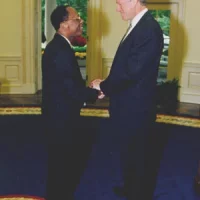The “special relationship” between the United States and the United Kingdom has served to unite the two nations over the past century. Thanks in part to a shared language, historically common enemies and similar political structures, leaders of the two countries have found it easier than most to achieve common objectives around the world. Perhaps… Read More "The Extra Special Relationship: Thatcher, Reagan, and the 1980s"
The Neutron Bomb — A Negotiating Dud
The neutron bomb, a low-yield thermonuclear weapon which would be especially lethal to enemy ground troops but would not seriously damage buildings, became the focus of international controversy when the U.S. and a few others had proposed deploying the weapon in Western Europe to counter the Soviet threat. Many NATO countries were unwilling to accept… Read More "The Neutron Bomb — A Negotiating Dud"
Modern Turkey’s History of Military Coups
The July 2016 attempted coup d’état in Turkey was the latest in a series of military interventions in the nation’s history. The military has forced out four civilian governments since 1960, when Premier Adnan Menderes was deposed. In 1971 the military forced Prime Minister Suleyman Demirel to resign; in 1980, the Turkish army launched the… Read More "Modern Turkey’s History of Military Coups"
The Panama Riots of 1964: The Beginning of the End for the Canal
When President Theodore Roosevelt signed the Hay-Bunau-Varilla Treaty with Panama in 1903, the United States gained sovereignty over the portion of the newly formed country of Panama which would become the Panama Canal, a modern-day marvel that revolutionized international shipping and solidified America as a global power. While the benefits to the U.S. were enormous, the politics… Read More "The Panama Riots of 1964: The Beginning of the End for the Canal"
Should I Stay or Should I Go? Evacuating Liberia, 1990
Being caught up in violent political upheaval and forced to evacuate is among the risks of diplomatic service, as at the U.S. Embassy in Monrovia in 1990 in what the Marines called Operation Sharp Edge. The problems started a decade before when a group led by Master Sergeant Samuel Doe staged a military coup in Liberia, toppling the… Read More "Should I Stay or Should I Go? Evacuating Liberia, 1990"
The United States found itself embroiled in several interventions in the 1990s that focused on upholding basic human rights standards and encouraging democratic regimes to flourish, from Somalia to the Balkans to America’s own backyard in the Caribbean. Despite Haiti being the second nation in the Western Hemisphere to proclaim independence, it has suffered from… Read More "“The World Was Tired of Haiti”: The 1994 U.S. Intervention"
The U.S. Returns Okinawa to Japan, 1971
In 1945, towards the end of World War II, the U.S. Army and Marine Corps invaded Okinawa with 185,000 troops; a third of the civilian population was killed. After the war, Okinawa became a de facto trustee of the U.S. government, which established several military bases there and on other Ryukyu islands. In addition, the U.S. Civil Administration of… Read More "The U.S. Returns Okinawa to Japan, 1971"
134 Cells, One Inmate: The Closure of Spandau Prison
From November 1945 until October 1946, the International Military Tribunal indicted and prosecuted Nazi leaders for their roles in the Holocaust and other crimes against humanity at the Nuremberg Trials. Eleven of the 24 men who were tried as major war criminals were given the death penalty. Seven of them — Konstantin von Neurath, Erich… Read More "134 Cells, One Inmate: The Closure of Spandau Prison"
Hong Kong Returns to China, Part II
As the formal handover of Hong Kong to China approached, many grew concerned about Beijing’s intentions. Tens of thousands of Hong Kong citizens emigrated in the late 1980s and early 1990s for places like the UK and Vancouver while several came to the U.S. consulate in Hong Kong with claims of American citizenship. The event… Read More "Hong Kong Returns to China, Part II"
Spain’s Post-Franco Emergence from Dictatorship to Democracy
Spanish leader Francisco Franco died November 20, 1975 at the age of 82 after 36 years in power, first as a dictator, then as head of a semi-pluralist authoritarian system. His regime was held responsible for the deaths of as many as 400,000 political dissenters, many during the Spanish Civil War from 1936-1939. Franco persecuted… Read More "Spain’s Post-Franco Emergence from Dictatorship to Democracy"

